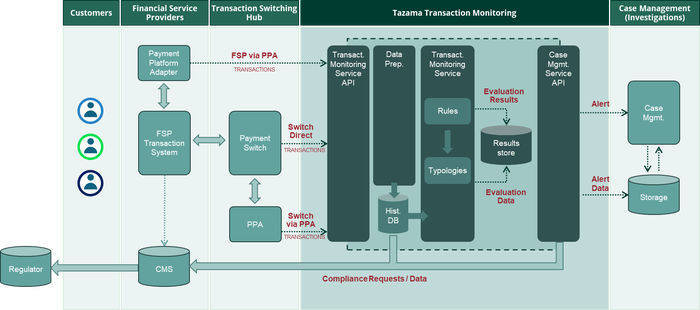A non-profit organization has launched the first open source platform aimed at providing sophisticated anti-fraud capabilities to financial systems in Africa, as well as parts of Asia and the Middle East.
The Tazama open source project is real-time financial transaction monitoring software that can be deployed by digital financial service providers to detect and block fraudulent transactions and protect consumer accounts. While large financial companies like Visa and Mastercard have such capabilities, smaller financial institutions and government agencies in the region do not, making their financial systems prone to fraud and undermining citizens’ trust in the system.
Funded by Linux Foundation Charities and the Bill and Melinda Gates Foundation, the open source Tazama project has completed alpha pilots in Jordan and South Africa and plans to expand its deployments. It is already working with the Central Bank of West African States (BCEAO) and rural banks in the Philippines, says Greg McCormick, executive director of the Tazama Project at the Linux Foundation.
“What we want is a system that is convenient, easy to use and can handle some types of fraud,” he says. “We’re trying to really serve the underserved, if you will, and put them in the bank and get them into the future and hopefully help them” get to a place where they’re making more than a few dollars a month, he adds.
Providing anti-fraud services like Tazama is crucial increasing trust and increase citizen participation in a country’s financial system, which is a key part of overall economic development. Africa and some Middle Eastern and Asian nations lag far behind in account ownership compared to the United States, Europe and Asia’s richer economies. According to the data, only 27% of adults in Egypt have a bank account, 47% of adults in Jordan, 45% in Kenya, 36% in Burkina Faso and 45% in Nigeria. The 2021 Findex Global Databasepublished by the World Bank.
THE Gates Foundation discovered that providing banking services to low-income citizens is a key component to achieving the goal of contributing to the spread of real-time digital payments, which can help economies grow. In many countries, people live on only dollars a month, which makes it unprofitable for large financial companies to create their own financial networks. Instead, internal systems based on open source software are needed, McCormick says.
Real-time fraud detection
The open source software Tazama is a server that collects information and applies more than 270 different rules, each of which produces a unique response. The rules are combined into typologies, which look for particular types of fraud, according to Tazama documentation.

The information flow for a financial transaction in the Tazama anti-fraud platform. Source: Tazama.org
With the growth of digital fraud in Africa and other parts of the world, such as a recent wave of Magecart attacks on e-commerce websites, protecting the financial system and its participants from fraud is particularly timely.
The pilot project’s servers currently perform 2,300 transactions per second, which results in real-time fraud detection, McCormick says.
“We’re strengthening the network, so fewer places for people to come on board and do bad things – less money mulling and problems like that,” he says. “We currently offer about 30 types of fraud checks, but to be honest, everyone who uses this system will customize it.”
For example, the Central Bank of West African States (BCEAO), composed of over 270 banks, 17 mobile money operators and 43 money “creators”, will likely impose an anti-fraud capacity on such organizations and will result in approximately 60 % to 70% of organizations use Tazama, he says.
Adding artificial intelligence for cybersecurity
The platform is a machine learning engine that captures transaction data in real time, stores the information in a database and then uses behavioral modeling to determine whether the transaction is likely legitimate or a sign of fraud, says Justus Ortlepp, product manager for Tazama.
“The intention is for the platform to be able to capture all of your transactions so that we can have as complete a picture of someone’s behavior as possible,” he says. “That ‘someone’ could be a company, a legal entity trading over the network, or an individual using the financial system.”
Tazama also targets other types of financial ploys. Employment fraud, in which the criminal offers people jobs but then steals their money, is common in some parts of Africa, while laundering stolen funds through other criminal schemes is another common attack on financial systems, says Ortlepp .
“Even though money laundering is not typically fraud, ultimately fraud still becomes money laundering, because that is how fraudsters steal their funds and hide the proceeds of that particular crime,” he says.
Tazama Group plans to integrate more features into the platform, including explainable AI and other advanced features. Many targeted countries do not have a skilled cybersecurity workforce or resources to implement a complex platform, so it is important to use machine learning and artificial intelligence to make the platform easier to use and manage, says McCormick.
“We need to make it pretty simple, so that banks and fintechs and other people can manage it and build trustworthy networks and do trust transactions,” he says. “So the future is really about simplification, using artificial intelligence and adding more features as far as ease of use.”